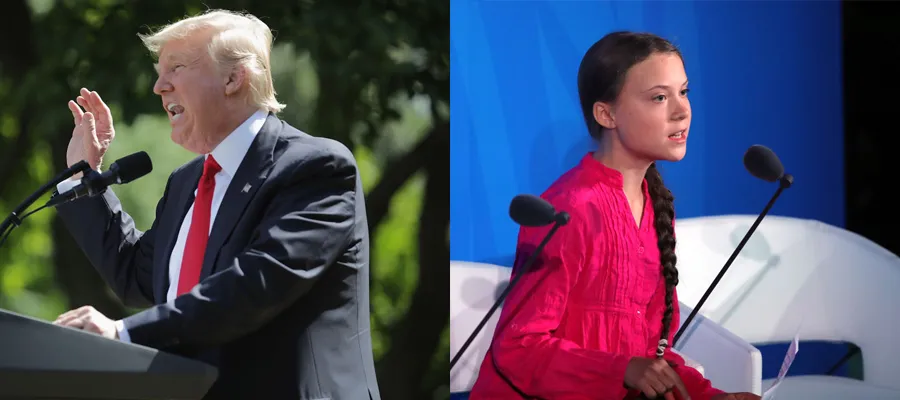
Both the former US President and the environmental activist have used a particular type of storytelling that employs heroes, villains and plotlines promising change to rally support, the research found.
Presentation techniques
The public figures have used similar presentation techniques to convince listeners of their understanding of climate change and what ought to be done, researchers say.
Researchers at the Universities of Edinburgh and Linköping in Sweden examined some of Trump and Thunberg’s prominent speeches for what they call the populist narrative frame, where common storytelling techniques are used to cut through complex issues and mobilise people for a cause.
Narrative frame
The populist narrative frame highlights a betrayal by the elite at the expense of the interest of the people, a clear plot with heroes and enemies and a lead character, called a truth teller, who exposes other characters as corrupt or untrustworthy, the researchers say.
They chose Trump and Thunberg’s public statements to see if two contrasting storytelling styles – and differing perspectives on the climate – use similar populist storytelling methods to achieve a similar result, to challenge mainstream discussions on climate change.
Speeches examined
Researchers examined the content of four speeches by Trump. They included the President’s speech at the White House rose garden in 2017 where he outlined why he withdrew the US from the Paris climate agreement, as well as two interviews and 74 tweets.
They also examined six well-known speeches by Thunberg – including at the United Nations Climate Conference in 2018 and 2019, and the World Economic Forum in 2019 and 2020.
The academics found that both speakers focus on unmasking truth about climate change while exposing unfairness by other players involved in the issue.
Public statements
Trump’s statements placed emphasis on saving jobs and the US economy while highlighting negative elite influences such as questioning China for crippling the US’s competitive edge and presenting a view that the UN was biased against the US.
His speeches include references to some he defined as enemies in this process including references to “fake news”, “prophets of doom” who exaggerated climate change and "alarmists" who wanted to "control every aspect of our lives".
Greta Thunberg’s speeches presented climate change as an emergency while exposing corporate elites for destroying the planet for profit. Her statements criticise politicians and the media for letting exploitation happen without acting. In a 2019 speech she said: “You say nothing in life is black or white. But that is a lie. A very dangerous lie. Either we prevent 1.5C of warming or we don’t”.
Thunberg’s speeches also places adults as villains who are stealing the “dreams and childhoods” of the younger generation. She says “How dare you” to an elite which focuses on “money and fairy tales of eternal economic growth”.
Guided by words
The researchers say the findings help understand how words, expressions and plotlines may guide people on how to make sense of issues characterised by disagreement and complexity.
These findings support the theory that populism is not just an ideology or a way to mobilise people for a particular cause, but it is also a way to tell a story based on concepts such as the heroic people, the corrupt elite, and a truth-teller. This is especially prominent in relation to complex policy problems such as climate change, where the evidence leaves citizens overwhelmed and uncertain.
Dr Markus Ketola
School of Social and Political Sciences
Stories play a key role in how complex climate change data is made meaningful to a non-expert audience, helping us better understand how politicians and policymakers go about winning over citizens’ support for their policies. It could be that the stories we tell will end up being more important than scientific evidence in explaining how - and whether - humanity responds to the threat of climate change.
Dr Johan Nordensvard
Division of Political Science at Linköping University
The study is published in the Journal of Environmental Politics.
Open Access version of the paper
School of Social and Political Science
{Image credit: Getty Images/ WinMcNamee/Spencer Platt}

